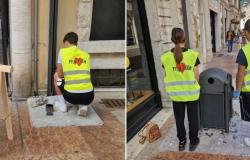EMILIA ROMAGNA. EuroUSC Italia leads the European Di-Pegasus project to test new technologies capable of flying and managing fleets of drones and air taxis. The development of a platform to evaluate the feasibility and impact of innovations is also envisaged.
A drone making a delivery
Di-Pegasus (Digital competitive next generation aviation technologies for sustainable business models, products and services) is a leading consultancy company in Italy for services dedicated to drones.
The transport sector is one of the main causes of CO2 emissions in Europe and the main cause of air pollution in cities. To achieve climate neutrality within the timescales established by the European Green Deal, the Di-Pegasus project focuses on innovative solutions such as unmanned aircraft systems (UAS) and traditional, but fast and flexible, modes of air transport, such as seaplanes. The objective is to make travel more sustainable, efficient and safe, both for passengers and goods, by improving urban mobility and connections between nearby cities.
Di-PEGASUS aims to realize autonomous, economical and environmentally friendly operations for seaplanes, VTOLs (vertical take-off and landing aircraft) and drones, through different technologies that will be developed over the course of the project, both for air and ground transport.
The first Italian case study will be conducted in Emilia-Romagna and will explore the possibility of delivering goods more efficiently and quickly through the use of drone fleets. The aim is to reduce car travel for urgent deliveries in urban and suburban areas, replacing them with autonomous drones that will fly at specific times and on specific routes.
Marco Ducci, project leader of Di-Pegasus and CEO of EuroUSC Italia, underlined: “Delivery with drones is becoming reality, but there are still several technological challenges before these applications can be widely spread. For example, there is a lack of systems that allow hundreds of drones to be managed simultaneously, which allow the operator to efficiently monitor operations and guarantee the safety of the people flown over”.
The Italian case study is working on the transport of goods, with the use of drones, from industrial and peripheral areas of cities to microhubs located in the center of the cities themselves. However, this is only one of the hypotheses, the project is ready to also take into consideration the proposals of operators, airport authorities and couriers.
Last May 17, a workshop was held in Bologna which involved actors from different backgrounds, in order to gather impressions on the technical objectives that the project will develop. Starting from the data that emerged during the workshop, the partners will begin working on the technologies, which will be ready by the end of 2026. The results will then be evaluated through focus groups and ad hoc surveys aimed at interested parties and end users.
Marco Ducci, concluded: “The unknown often arouses fears, especially when it comes to new technologies. Therefore, it will be essential to clarify the nature of the innovations tested and illustrate their benefits, involving all interested parties, from citizens to political decision makers. This approach is of particular importance in the context of Emilia-Romagna, where tests of technologies for last mile delivery services will be carried out.”


Some drones in flight
A digital platform will also be designed to evaluate the feasibility of the new business models generated by these technologies in specific contexts. Various performance indicators will be taken into consideration, including cost sustainability, job creation, emissions savings and investment methods, with the aim of providing recommendations to policy makers and the actors involved.
The platform will also review regulatory compliance, outline a security assessment process and report any gaps that need to be filled. Furthermore, public acceptance, the impact of these shifts on society, the economy and the environment will be taken into consideration. Finally, possible investments in new infrastructures such as vertiports will be studied, but also the adaptation of existing ones.
EuroUSC Italia, together with other Italian partners including PMI Deep Blue, RINA Consulting SpA, Interconsulting Engineering srl and Istituto Trasporti e Logistica, will work to identify and define a process that allows innovation to go hand in hand with the consensus of communities on which the introduction of the technology will impact.
It will be very important to involve all stakeholders in the initial and start-up phase of the technology to prevent it from being “dropped from above”. Especially in Emilia-Romagna where technologies for last mile delivery services will be tested.
EuroUSC Italia will also develop guidelines to ensure high quality of technical and research work; must identify risks and take corrective actions if necessary, in order to ensure compliance with existing ethical standards and guidelines.
© ALL RIGHTS RESERVED






